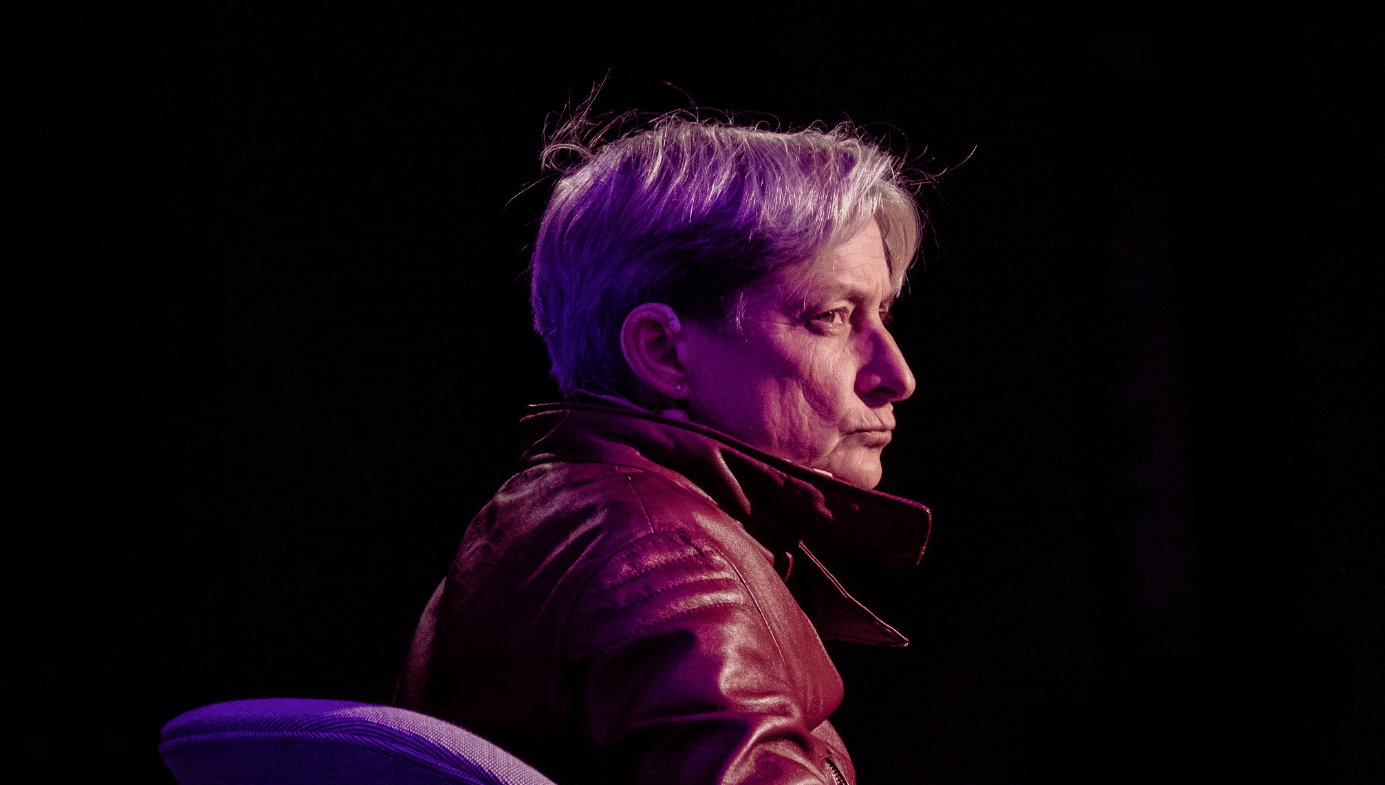judith butler
Judith Butler: Enough Already!
Maybe Butler is an anti-identitarian when it comes to gender, but she sure defends her political identity most rigidly, indeed, in an obscurantist way.

If I were Judith Butler, I would desist from giving interviews to journalists. She has done a few lately (with Owen Jones on YouTube, with Slate magazine last year, with the Guardian a few days ago, etc.) and in each and every one of those interviews, she repeats the same thing. And in this repetition, she affirms she still lives in the 1990s. It may not be altogether her fault. She is repeatedly interviewed about her book Gender Trouble that was published in the ‘90s, the occasion being the contemporary dominance of the trans movement. And so she opines on what she said in the book. The trouble, though, is that she opines as if what she says is “subversive,” a radical parole in a langue of traditionalism. “We need to rethink the category of woman,” she repeats in her latest interview with the Guardian (September 7th) as if we had not already done far more than that.

We have legislated gender in which her main claim in Gender Trouble that sex is “socially constructed” is the heart of the legislation. Not only have we legislated it, but the cultural institutions of this country have adopted it as the new normative order and used their institutional power to enforce it.
Transgender fighter Alana McLaughlin wins MMA debut https://t.co/S4RLM3JEa6 pic.twitter.com/yeBo9YF1xM
— New York Post (@nypost) September 11, 2021
From the legacy media, to social media, to tech companies, to educational institutions from schools to universities are all now repeating in unison: “sex is socially constructed.” Butler speaks as if what she says is not already endorsed by the state. Perhaps it is terrifying for the subversive professor of the ‘90s to realize she is now in power? She would have to confront the rebellion from the margins, a place that Butler has endowed with virtue and has positioned herself in. If power was everywhere, as Butler, per Foucault, had theorized, and Butler was now in power, then surely rebellion against it is not just what the theory foretold, but the same virtue would have to be attached to it.
In the same interview, we read the same tired talking points: the bad TERFS are allied with the religious Right obstructing trans rights, shame on them. This is an assertion that goes even further back to the ‘80s. The one hint she reveals in that interview that we lived in a different era, is her assertion that we must fight the forces of “fascism.” This is clearly a reference to the right-wing populism that brought Trump to power. She has sought to update the evil forces I suppose: it is now right-wing populism, the religious Right, and radical feminists (TERFS) who are standing in the way of her subversive claims. This is all nonsense, of course. None of these forces holds power over cultural institutions, especially the elite ones and those which indoctrinate youth to her theories of gender. Perhaps recognizing that her theories are in power will force Butler to look at their impact in the world.
Butler, like many celebrity academics of her generation, was an academic of “theory” with no interest in “sociology.” Theory is elite, it is what smart professors do. They deconstruct the reigning order through their theories. Whether ordinary people are interested in deconstructing the gender order or what the impact of enforcing these theories on them via powerful cultural institutions is of no interest. It is demeaning for the theory professor to look at the social lives of others. Considering the plight of lesbian teenagers who went further than “enjoying the world of they”—as Butler refers to herself in the Guardian interview—by moving from taking hormones to undergoing a double mastectomy within a year, is just too messy. To know that these girls lived to regret it and wondered where all the adults were is even messier. To wonder as to the impact of the disappearance of the “dyke” in the lesbian community many of whom have decided they are now transmen, erasing the erotic place of the “dyke” in the lesbian community, is too “sociological.” Goodness: What is the fancy theory for that?
The whole point, of course, is that those theories are a discourse and pedagogy directed at people: a continuous finger wagging at their very common ideas and the very ordinary gendered lives they live. If they were the source of theorizing, theory one suspects would look very different. To claim that “sex is socially constructed,” is not just to utter gibberish, it is to attack the very common sense of people. It is to make people feel “mad!” It denies the material foundation of the reproduction of the species (male/female) and the linguistic recognition of the fact. It is idealist to the core. Not that her interviewer—a self-described “Queer Historian who edits Transgender Marxism”—would point that out, mind you! Speaking of which, if you were in doubt that this was elite discourse directed at ordinary people, check the credentials of Butler's interviewer. (The more legacy media fills its ranks with the hyper-educated and their rarefied ideas manufactured in elite universities, the more those journalists long for the graduate seminar.)

Butler asserts that “queer for me was never an identity, but a way of affiliating with the fight against homophobia.” If this were a critique of the identity-obsessed trans movement, it was so subtle I doubt that her object of critique even noticed it. The trans movement has indeed taken “identity” from its usual liberal legalist articulation and inflated it beyond recognition, and Butler is right to notice that and to distance herself from it. It is identity on steroids in which one's identity changes by the day if not by the hour. A buffet of identities that one serves oneself with daily and screams for the world to recognize it on TikTok. From group identity as liberal entitlement to individualist identity as neoliberal consumerism.
But, then again, perhaps daily or hourly identity is the only possible cultural embodiment of academic “anti-identity!” Not only was her critique of the trans movement barely noticeable, indeed, a paragraph later, she withdrew it and endowed the trans movement with the best of intentions, “The right is seeking desperately to reclaim forms of identity that have been rightly challenged. At the same time, they tend to reduce movements for racial justice as identity politics, or to caricature movements for sexual freedom as concerned only with ‘identity.’ In fact, these movements are primarily concerned with redefining what justice, equality and freedom can and should be.” A hint of critique that is immediately withdrawn through the usual trick of re-centering the evil Right as the problem.
This allows Butler to do two things: on the one hand, deny the state power her ideas have acquired (the new hegemon), a power that has produced horrible distributive consequences across the board: revival of heterosexual norms (dykes becoming trans men who sleep with women); medicalization of children’s bodies; the slippery slope of endowing children with capacity to consent to “gender identity"; thought and language control that attacks the very common sense of people; and the list goes on. On the other hand, it allows Butler to imagine that ‘90s politics go on; a discursive trope familiar among the militant progressives who have become mainstreamed by the post-Trump Democratic Party.
Maybe Butler is an anti-identitarian when it comes to gender, but she sure defends her political identity most rigidly, indeed, in an obscurantist way. Academics who pedaled “critique” 30 years ago are having a hard time. Not only are they unable to see how their very ideas predict their own demise, but that those ideas are no harbinger to a deepened democracy as they had heretofore claimed. It turns out that anti-identity translates into daily identities of the therapeutic subject; a menu of consumer selection sought for self-soothing; “social construction” as a commodified business plan for the post-humanist future; and radical progressivism which amounts to nothing but a constant denunciation of the people those academics claim to want to liberate. Far from being apostles of revolution, those academics provide the most articulate apologetics for the contemporary war of the elites on the working class.







